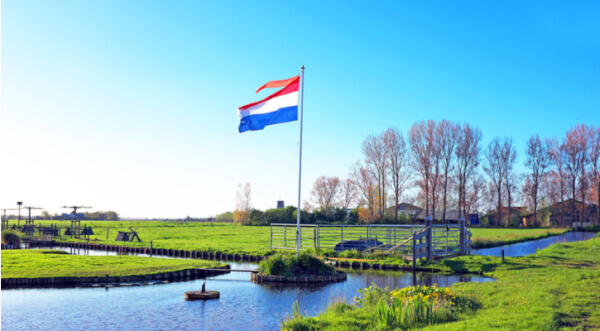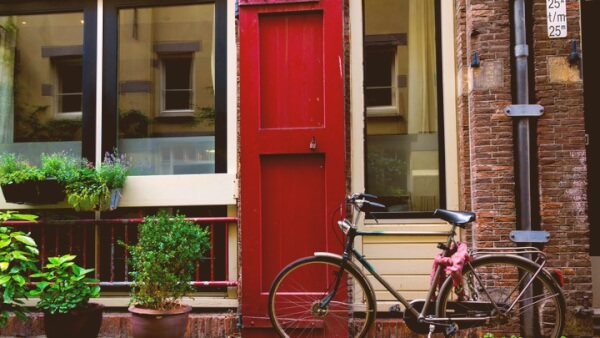Finding and getting jobs in Amsterdam: full guide for Americans
Finding a job in Amsterdam will be way easier after reading this guide.

The Netherlands is an attractive destination for expats looking to live and work in a vibrant and cosmopolitan country. An advanced economy, low unemployment and strategically important location means that many global firms have a presence in the Netherlands which has created many opportunities for foreign workers.
If you're moving to the Netherlands for a new job then you might need to get a work visa before you get on a plane. Although arranging visas and permits can be time consuming, it doesn't have to be too much of a headache. Read this guide to learn more about getting a Dutch work visa.
| Did you know? With a Wise Account, you can |
|---|
|
Your first priority should be to figure out if you need a work permit at all. In some cases, depending on your nationality and the role you’re going to take on, a permit might not be necessary.
If you're a citizen of another European Union (EU) country, Norway, Iceland, Liechtenstein or Switzerland, then you don't need a permit to live or work in the Netherlands.
In some cases work permits aren't necessary, but you might still need an entry visa or residence permit.
The specific details will depend on your nationality and reason for entering the country, and are subject to change. For example, although they had previously been able to freely access the Dutch labour market, as of 1 January 2017, Japanese nationals again need a work permit to legally hold a job in the Netherlands.
If you're a highly skilled migrant with a job offer which fulfils certain minimum requirements, you may not need a separate work permit. In this case your residence permit is enough to allow you to work legally. The position you have been offered must typically last for more than four months and pay above a minimum threshold.
Firstly, you need to check if you need a provisional residence permit to cover your initial entry into the Netherlands. If you're from the EU or other exempt nationalities you won't need this, but instead can enter using your regular passport and apply for residence and work permits once you're in the country.
In some cases you'll need a separate residence permit and work permit, and in others you may be offered a single permit which covers both. This depends on your nationality and the type of role you’re coming to do. More details can be found on the local government website.
If you're applying for a single permit then this can be initiated by either your employer or yourself. If you're applying from outside of the Netherlands then you'll need to visit your local embassy in your home country. Also, if you need a separate work permit and residence permit then your employer will have to handle the application for the work permit on your behalf.
Immigration in the Netherlands is handled by the Immigration and Naturalisation Service (IND). All forms can be downloaded from their website, which has a wealth of helpful information for both you and your employer. There are quite a range of different types of work permits, and some exemptions for certain jobs or nationalities. For example, you follow a different process if you intend to work in some industry segments or are a cross border worker. Luckily, the details are all set out on the IND website.
All application forms are available online and the documents required for each application are noted on the form. Depending on the type of visa and your nationality, the application process can cost up to € 897. However, some nationalities have reductions on this fee.
If you're eligible for a single permit the waiting time for this document should be no more than a couple of weeks, once you have entered the country and completed the application.
Dutch work permits are subject to a labour market test, meaning that in many cases your employer will have to prove that there was no other Dutch or EU national worthy of the job. This criteria is sometimes waived, for example if you're transferring with the same company to a new position in the Netherlands.
More useful information can be found at the European Commission mobility portal, EURES, and the EU Immigration Portal.
The documents that you need to provide will depend on the type of visa you want to receive and what your nationality is. Additionally, the application forms for each visa type also include detailed instructions about the specific documents and formatting you need to send
You can expect to be asked for:
A valid passport and recent passport photographs
Complete application form
Proof of payment of the relevant fees
Proof of work or study, according to the requirements of your specific visa type
Documents provided must be translated and legalised. They can be provided in Dutch, English, French or German.
Depending on the type of work you're planning on doing, it might be possible to apply for an EU Blue Card. Similar to the US Green Card, this document gives you the right to work across most EU member states (excluding Denmark, Ireland and the UK). To be eligible for a Blue Card, you must be from a country outside the EU, be highly skilled (typically meaning you have completed a bachelor's level university degree, or have five years of senior professional experience), and have a binding job offer or active work contract.
The Blue Card application process is fast tracked by member states, meaning it's typically quicker than other forms of work visa application. However, it may still take up to three months. Although you start the application process online and through a single point of contact, the process may vary depending on your personal circumstances. The Blue Card network has a good website and offers support to applicants to help them understand the process.
Seasonal workers can get a specific permit to work for up to 24 weeks as long as they haven't been in the Netherlands for the 14 weeks prior to their permit starting. Also, the employer must be an officially registered business, and you'll need to prove that you can support yourself during your time in the Netherlands. Full details are available on the Dutch government website.
If you're from Canada, Australia, New Zealand or South Korea, you may be able to apply for a working holiday visa, valid for up to a year. However, you must be under thirty years old to be eligible.
If you're under the age of 30 and want to work as an au pair, an au pair agency can apply for a work visa on your behalf. This would be issued for up to a year and is only valid under set conditions, such as your host family proving their ability to support you.
If you have recently graduated you may be able to get a one year visa which allows you to come to the Netherlands specifically to find a job. This is known as the orientation year visa, and is a relatively new addition to the range of visa options available.
You can apply for a residence permit as a self employed worker if you intend to start a business in the Netherlands. In this case you must have at least a 25% stake in the business, and take on the entrepreneurial risk yourself. If this isn't your situation then you'll be considered an employee of the business and will need to apply as outlined above for a regular visa.
Whatever work you intend to do, it must be deemed as adding to the Dutch economy. This is decided based on a points system covering things like your personal skills and the innovative nature of the business you intend to open. Full details are available on the IND website.
Some special arrangements exist, for example if you're coming to start an new innovative business in technology. In this case the Netherlands Enterprise Agency might be able to provide helpful information and contacts. Application forms and details of the process are available on the IND website.
It can be quite difficult to get a self employed visa for the Netherlands. If you're a freelance worker you should prove that you already have contacts in the country and have work lined up. If you're starting a business you'll need to prove rigorous planning and that you have the skills, experience and qualifications to be successful.
If you're an EU citizen, and family members who aren't nationals of EU states, then you can apply for a residence certificate for them under the family reunification scheme. This scheme applies to your partner, children and in some cases dependant parents. If you're not from the EU then you'll have to apply for residence permits for family members to join you, which is a slightly different process.
In either case you'll have to prove your relationship to the family members joining you, and pay an application fee of around € 50.
Holders of the EU Blue Card are also able to apply for visas on behalf of family members without a waiting period under the family reunification scheme.
Once you arrive in the Netherlands and have arranged your permit, you must register with the Municipal Public Records Database in the municipality in which you'll live and work. It’s also mandatory to take out health insurance within four months of arriving in the country. Depending on where you have traveled from you might also be required to undergo a test for tuberculosis.
Now you're all set. With your visa in your hand. You can get on with booking that flight and setting off to your new home.
To get the most of your money in the Netherlands, you'll want to open a bank account in the Netherlands, which you can do before you arrive.
Once you send money to the Netherlands, consider using a money conversion service like Wise to avoid unfair exchange rates. There's a small transparent fee, and when your money is converted from one currency to another you’ll get the real exchange rate - the same one you can find on Google. Not only that, but Wise receives and sends money via local bank transfers instead of internationally, further saving you money by cutting out hefty international transfer fees.
If your trip is short or opening a bank account in the Netherlands isn't an option, you can always withdraw money from your foreign account using an ATM there. Just keep in mind it'll be more favorable to agree to be charged in the local currency, not your home currency.
Regardless of when you start your new job abroad, it should be fairly straightforward to get yourself a visa if you follow the right steps. The most important part is just to make sure to enjoy your new adventure.
*Please see terms of use and product availability for your region or visit Wise fees and pricing for the most up to date pricing and fee information.
This publication is provided for general information purposes and does not constitute legal, tax or other professional advice from Wise Payments Limited or its subsidiaries and its affiliates, and it is not intended as a substitute for obtaining advice from a financial advisor or any other professional.
We make no representations, warranties or guarantees, whether expressed or implied, that the content in the publication is accurate, complete or up to date.

Finding a job in Amsterdam will be way easier after reading this guide.

A full overview on how healthcare in the Netherlands works.

In the Netherlands, there are more than two weeks worth of national holidays each year. But some of those holidays are more important than others, and banks...

Moving to the Netherlands? Lucky you: it’s a friendly, laid back country with a diverse international population. It’s not always the cheapest place to live,...

The Netherlands attracts large numbers of expats coming to work in the global companies based in Amsterdam, and in the many diplomatic institutions around the...

Amsterdam is home to large numbers of international companies, not to mention world class educational institutions. Which means professionals and students...